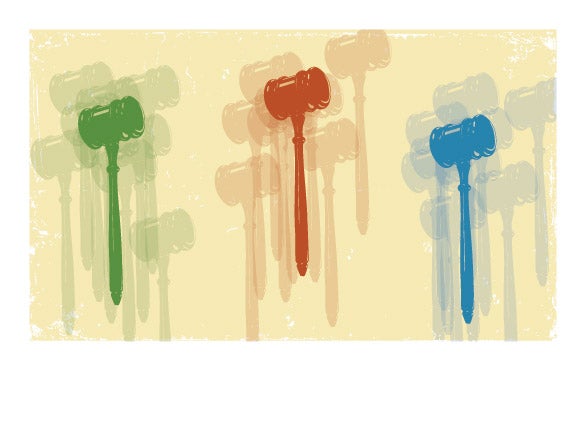A Legal Realist lens for economists
When judges rule on cases involving issues such as contracts, property rights, antitrust or taxes, they are not just making legal decisions. They are making economic policy. Thus, as Professor Matthew Stephenson ’03 asserts, it is in the interest of those who study economics to consider how those decisions are made.
“It would be a mistake, if you were an economist trying to understand how economic policy worked, to assume that judges are merely neutral enforcers of law,” says Stephenson. “Judges often have a great deal of discretion when they interpret legal documents, and therefore understanding their decision-making processes is important to understanding economic outcomes.”
In a paper recently published in the Journal of Economic Perspectives called “Legal Realism for Economists,” Stephenson examines judicial decision-making based on the theories of the American Legal Realists, a group of lawyers, judges and law professors who were most influential in the 1920s and 1930s. This movement, he writes, provides an alternative to the two common theories on judicial decision-making: Formalism, which holds that legal questions have a “right answer” based on canonical legal materials, and Skepticism, which says that judges use the laws available to justify the outcomes they desire. Realism forgoes either extreme, attempting to find patterns in judicial decisions not dictated solely by formal rules or ideology. The Legal Realists, Stephenson says, showed “nuanced, insightful understanding of the interaction between law and discretion that seemed like it would be useful to economists.”
Legal Realism looks for patterns in judicial decisions beyond formal rules or ideology
In the paper, he describes the Realist idea of legal constraint, the belief that while judges could use law to justify nearly any result, they also are constrained by legal sources and principles. Writing for an audience of economists (Stephenson got his Ph.D. in political science at Harvard University), he also cites the “opportunity costs” that influence judges depending on how motivated they are to reach a desired result. “[J]udges,” he writes, “do not automatically select the opinion that is easiest to justify legally, nor the opinion that delivers the most desired outcome, but rather the judge balances these interests, making whatever trade-off is optimal in a given case.” As an example, he cites John Marshall’s decision in Marbury v. Madison, which favored the chief justice’s political opponents, but also entrenched the doctrine of judicial review that he sought to establish.
Framing judicial decision-making through the prism of Legal Realism highlights the degree to which judges are important to economic policy and the large amount of discretion they have to shape it, Stephenson says. And he hopes that economists will take heed, as they consider how these important legal and economic actors make decisions.
“The ultimate goal,” he says, “is to understand better how both law and the economy work in the hopes of making both work better.”
Excerpt: Opportunity costs and judging
“No one, to my knowledge, has developed a fully convincing social scientific account of the incentives that shape the judicial desire for legal persuasiveness and the differential costliness of various legal arguments. Yet contemporary participants in the legal system regularly report that something like this actually does exist. Figuring out why judges experience law as constraining (assuming that they do) might suggest additional insights into how variation across judges may affect case outcomes. For instance, does a judge’s legal talent affect the degree to which that judge experiences law as a constraint? Perhaps a more talented judge will face lower costs in finding a plausible legal argument to justify a preferred conclusion, which suggests talent is inversely correlated with constraint. However, a more talented judge may also face relatively higher costs for engaging in more creative legal arguments because of the greater attention to detail that such arguments will demand from a meticulous judge. As another possibility, judges’ backgrounds and personal characteristics as well as their method of selection and retention may also affect how much they care about legal craft, and what sorts of legal arguments they or their constituencies experience as ‘persuasive.’”
From “Legal Realism for Economists,” Journal of Economic Perspectives
